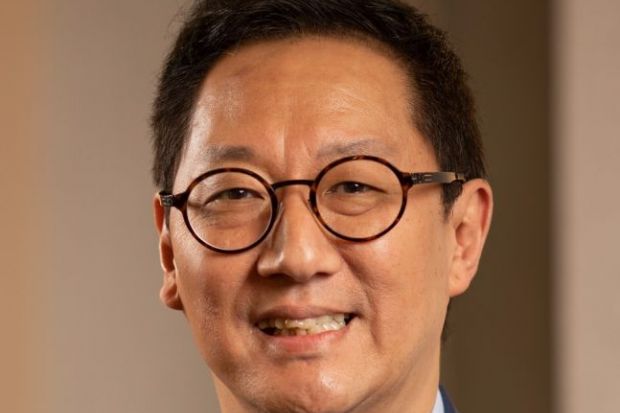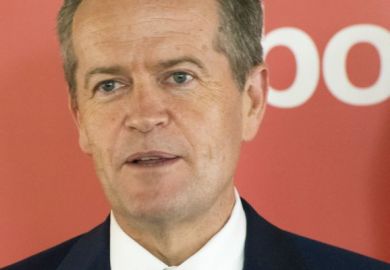Taking the reins of one of the top public research universities in the US, Santa Ono appears to be planning anything but resting on its considerable laurels.
Professor Ono moved into the University of Michigan presidency in October, after heading the University of British Columbia (UBC) and the University of Cincinnati over the past decade, where he used his perspective as the son of a US immigrant to become a leading voice in higher education on student equity, affordability and well-being.
Michigan, like most of academia, isn’t without those kinds of challenges. The Michigan leadership opening arose from the university’s firing of Mark Schlissel over an affair with a subordinate, and its elite academic reputation comes with gaps in enrolment and achievement levels among lower-income students.
Outlining his plans for the presidency, Professor Ono promised aggressive attention in those areas and much more. The university just organised a full-day retreat, with regents and other top university officials, to kick off a year-long process of assessing and revising Michigan’s fundamental approaches to its mission.
Areas of expected overhaul include the extent to which student instruction will be face to face versus remote and blended; the targeted mix of students in terms of domestic versus international and in state versus out of state; strategies for more thoroughly stamping an interdisciplinary character on to Michigan’s world-class research enterprise; and ways of bringing the Dearborn and Flint regional campuses closer to the Ann Arbor flagship.
“At the end of this calendar year,” Professor Ono told Times Higher Education, “we’ll report out to the world what that vision is, of what the University of Michigan will be in the next five to 10 years.”
Professor Ono is a naturalised US citizen, born in Vancouver to Japanese parents who also lived in Philadelphia and Baltimore. His father was a mathematics professor at UBC. A molecular immunologist and professor of paediatrics, Professor Ono said he took the Michigan job offer because of both the stature of the institution and his desire to be closer to his elderly parents in Baltimore and to his wife’s mother in Nova Scotia.
Much of what he described finding in Michigan are areas of clear strength that need to be made better, starting with its prodigious research portfolio. The university already has more than 3,000 tenured or tenure-track faculty, and Professor Ono wants to add “at least 100, probably more”.
It also has some of the nation’s leading examples of interdisciplinary expertise, through its Institute for Social Research and its Life Sciences Institute. “So the University of Michigan has already solved how to incentivise interdisciplinarity – we just need to scale it across the university,” with climate change a chief focus, Professor Ono said.
The aftermath of the Schlissel scandal was virtually certain to mean a moment of substantial reckoning on the institution’s record on equity. The choice of Professor Ono – the first Asian American leader at both Michigan and Cincinnati – guaranteed that.
Even before he arrived, Professor Ono noted approvingly, Michigan was working on the Inclusive History Project, which “will look in an honest way at our history, at the things that we’re proud of, but also the elements of our past as an institution that we are not proud of, and we will learn from that”.
Michigan’s racial diversity is strong, despite the state’s 2006 ballot initiative banning race-conscious college admissions policies. Its Pell share – about 20 per cent of its student body qualifies for the main federal grant subsidy – is below the national average of about 30 per cent but above the 15 per cent seen at other elite institutions. Yet Pell students at Michigan are about 5 per cent less likely to graduate than others, a gap Professor Ono sees as a key target for progress.
Professor Ono also has his attention on labour costs, especially after the recent six-week strike against the University of California system – largely involving postdoctoral employees and researchers struggling with pay they see as insufficient compared with their state’s high housing costs.
The Ann Arbor campus also has housing challenges, and Professor Ono said his administration plans intensive talks with its graduate student union over the next couple of months, with the goal of finding solutions short of work stoppages. “We hope to, through that process, come up with a way to support them in their very critical work,” he said.
POSTSCRIPT:
Print headline: Ono targets research and student experience
Register to continue
Why register?
- Registration is free and only takes a moment
- Once registered, you can read 3 articles a month
- Sign up for our newsletter
Subscribe
Or subscribe for unlimited access to:
- Unlimited access to news, views, insights & reviews
- Digital editions
- Digital access to THE’s university and college rankings analysis
Already registered or a current subscriber? Login







